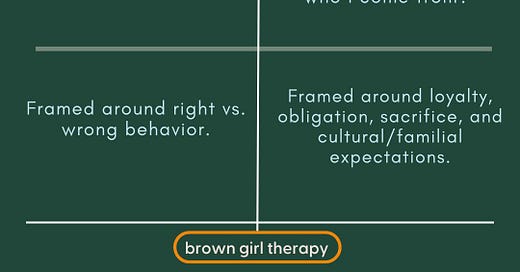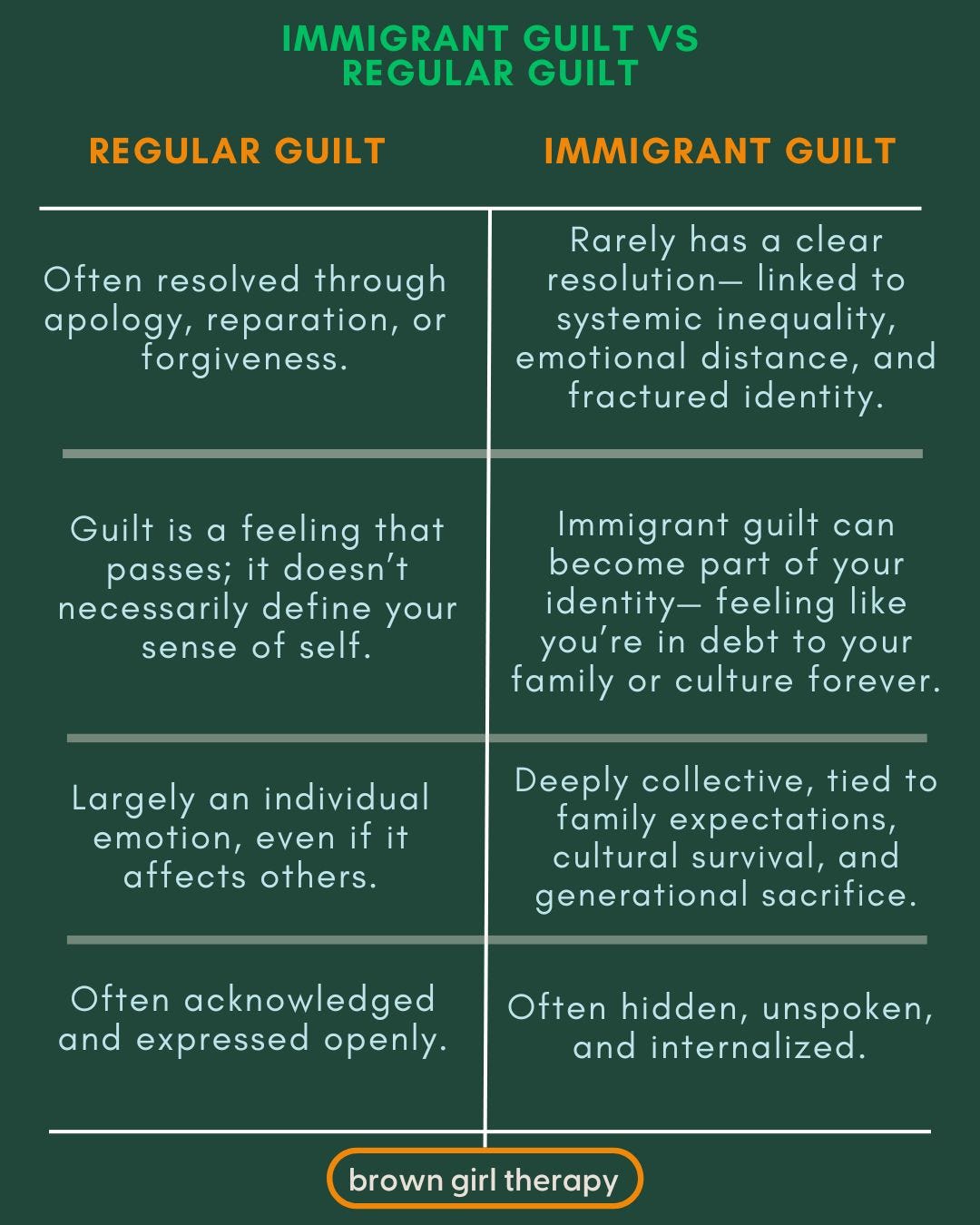Alright y’all we need to talk about guilt.
As a therapist, I have realized that Western psychology oversimplifies guilt. It’s said to be individual & about personal wrongdoing.
And chronic guilt is often considered irrational, or something to be processed and released. But for children of immigrants, there’s often this persistent immigrant guilt that is relational and deeply rational.
You DID benefit from your parents' sacrifices. You ARE navigating privileges others never had. You do feel torn between honoring them and honoring yourself.
That tension isn’t a cognitive distortion; it’s your emotional reality in a system that never taught you how to hold both duty and desire.
I’m not saying this immigrant guilt isn’t hurtful or unhelpful in some contexts, but Western frameworks lack the language or tools to engage with this emotion in a complex or nuanced way. Guilt for many of us isn’t just about psychology or an individual emotional experience – it’s about history, power, relationships and belonging.
→ Listen to this week’s podcast, “Why Guilt Feels So Heavy — And What to Do About it” and please consider leaving reviews if you are enjoying!
What Western mental health frameworks get wrong about guilt
In many Western contexts, guilt is tied to personal wrongdoing. It’s about “me vs. my conscience.” The goal is to fix the behavior, apologize, and move on. But in many collectivist or relational cultures, guilt is about relationships, obligations, and community expectations – not just internal moral failure.
“Let go of guilt” isn’t always helpful. Western wellness culture often encourages people to "release guilt" as if it's inherently toxic. For many immigrants, first-gen folks, or people from non-Western cultures, guilt isn’t just emotional baggage – it’s a signal of connection. It can reflect love, gratitude, or the weight of sacrifice. Trying to "let it go" without understanding where it comes from can feel like erasing part of your identity or lineage.
In many cultures, guilt is functional. It reminds you of your responsibilities. It anchors you to your family, community, or heritage. Western frameworks often treat guilt as something that blocks personal freedom. But in other cultural contexts, it’s something that grounds you. The nuance is in learning how to carry it – not always getting rid of it.
To be clear, not all guilt is healthy. Some is internalized oppression. Some comes from unrealistic expectations. But dismissing all guilt as toxic overlooks the cultural wisdom embedded in it. Sometimes, guilt means your values are intact.
Guilt isn’t always a problem to be solved. Sometimes, it’s an emotion to sit with, understand, and honor — especially when it’s tied to stories much bigger than your own.
Reflect: What has guilt meant to you — and where did that definition come from?
Immigrant guilt vs. Regular guilt
Immigrant guilt is not the same thing as regular guilt. And therefore they shouldn’t be treated as the same or conflated.
Regular guilt is a moral or ethical response to a specific action, whereas, immigrant guilt is an emotional and existential response to structural inequality, family dynamics, and cultural displacement/bereavement.
It's not that one is worse or better – it’s that immigrant guilt has layers that are often invisible but deeply impactful.
You can feel both types of guilt, and one can often compound the other, but knowing the difference can help you metabolize, manage, and respond to them in more apt and targeted ways.
Understanding the difference is important because immigrant guilt is often a chronic, culturally loaded, and often misunderstood experience. It doesn’t always look like guilt in the traditional sense. Immigrant guilt can look and sound like:
It doesn’t always look like guilt in the traditional sense. It may look like:
Overworking to “repay” parental sacrifice
Feeling like you don’t belong anywhere
Emotional burnout or depression that doesn’t seem to have a clear source
Feeling guilty for needing rest, therapy, or boundaries — especially if your family “just powered through”
Downplaying your achievements because they feel out of reach or irrelevant to your family
Financial anxiety, even when you're doing okay — because you carry the pressure to provide or "send back"
Not letting yourself dream “too big” out of fear it’s indulgent or unrealistic
Feeling responsible for your family's happiness or survival in ways that go far beyond your role
A fear of disappointing others for choosing a different path — career, love, parenting, even geography
Grieving things you never got to experience, and then feeling guilty for grieving them
Hiding parts of your life (relationships, desires, struggles) because of fear or shame
Feeling emotionally “homeless” — like you owe your past something, but no longer fully fit within it
“They gave up everything — and I’m complaining about being tired?”
“I shouldn't spend money on that… my parents never had these luxuries.”
“I need to make this worth it. I’m their retirement plan, their dream, their investment.”
“They didn’t come this far for me to rest, take breaks, or mess this up.”
“I feel bad for wanting more than what they worked so hard to give me.”
“How can I follow my passion when they never had that choice?”
“They stayed silent and endured — why can’t I just be strong like them?”
“I don’t call enough. I don’t visit enough. I don’t speak the language enough.”
“They won’t understand this life I’m building — but I still feel like I owe it to them.”
“I’m living the life they dreamed of, and I still feel lost. What’s wrong with me?”
Which of these resonate with you? Let’s talk about it!
So what can we do? Generally, we need to understand that immigrant and relational guilt is real, complex, and culturally embedded – not just a “problem” to fix. This is how we can rework it into self-compassion, boundaries, or cultural integration instead of self-punishment.
I give you lots of tools and tips in the free podcast episode! Below, I’ll break down 5 types of immigrant guilt and give you 5 tools for moving through this guilt.
💥 Immigrant guilt shows up in many forms Here are five common ones and a way to work through each:
Keep reading with a 7-day free trial
Subscribe to Culturally Enough. to keep reading this post and get 7 days of free access to the full post archives.





